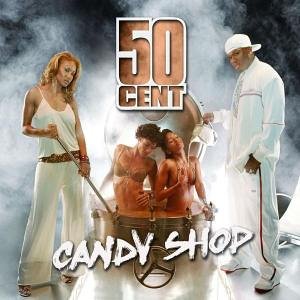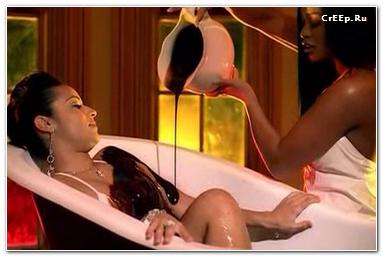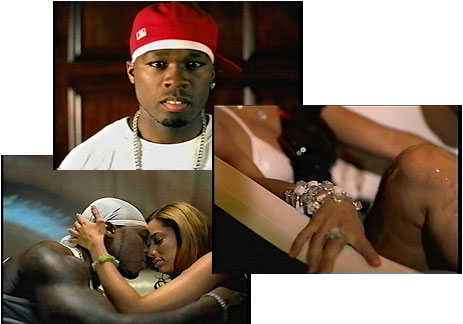Whoop! There it
is!
(A
webpage in response to an assignment from WS 350).
We will
look at 3 main issues centered on the women in the 50 Cent video, Candy
Shop. These 3 issues
are:
· Gender
· Class
· Sexuality
Gender

Gender stereotypes
have been evident in many rap videos throughout the years. Who can forget about
Sir Mix A lot’s Baby Got Back? 50 Cents Candy Shop doesn’t disappoint in the
stereotype arena. As you watch the video, it starts out by showing 50 Cent
driving up to what looks like a mansion. Once inside you see women dressed
provocatively. Candy Shop is basically a whore house (sorry for the language...
I couldn’t think of the name.) Women in most rap video’s are portrayed as money
hungry “bitches” and “hoes” This paints a negative stereotype about the female
gender. Gender roles in a lot of rap videos are very biased. Men are shown as
being the stronger gender, while women are shown as weak, and relying on the
man. “Diary of A video Vixen” is basically a diary of a former video girl, in
the book; she talks about how women are portrayed in the videos. She also talks
about how some of the rappers try to treat women in real life how they treat
them in the videos. The stereotypes about women are giving negative affects in
our society. Little boys are learning to call girls “bitches” and
“hoes”.
Class
50
Cent’s “Candy Shop” video is just another example of the rap world’s insistence
on dehumanizing women and focusing on material things. Young black men watching
these images want to have the things shown in the videos. They are taught that
they need to have the expensive cars with flashy rims, “bling bling” jewelry,
and designer clothes, to fit in with the images being shown to them in the rap
music videos. They show scantily clad women throwing themselves at the men who
have these material things. Lyrics of “Candy Shop” include, “Boy one taste of
what I got - I’ll have you spending all you got.” The song also talks about
drinking bottle after bottle of expensive champagne. Too much focus is placed on
materialism. After watching the videos, it is easy to see who exactly they are
marketed to; black men who love scantily clad women, expensive cars, and high
priced toys and gadgets. This gives young viewers the impression that the
bling-bling lifestyle is what they too should try to achieve. Rap videos like
“Candy Shop,” are making people want what they can’t have. This want will lead
them to accept and work within the confines of a system that ultimately seeks to
keep them in a state of passive acceptance, while the celebrities who are
shoving these ideals down their throats, continue to live in the lap of luxury.
Young African Americans are led to believe the racial myths that run rampant in
today’s society. They are told that “normal” is middle-class white men and
“black” is violence, the objectification of women, drug dealing, and the quest
of material things. We see this in our schools today. Students from low-income
families, whose school meals are paid for by lunch tickets and housing
subsidized by the government, come to school dressed in expensive name-brand
clothes. They wear large, shiny watches on their wrists and bulky crystal studs
in their ears. They speak to their female classmates in demeaning ways. They are
copying the images they have seen in the rap music videos.

Sexuality
Not So Sweet
Candy
In 50 cents
"Candy Shop" video, a variety of women of color are put on display. They are
referred to as candy that can be used in a variety of sexual ways. 50 cent goes
from bedroom to bedroom throughout the mansion and takes his pick from the eager
women, willing to fulfill all of his fantasies. 50 cent even has a Black woman,
Olivia, by his side singing a chorus that goes, “I’ll have you spending
all you got" proclaiming that yes he could have her body but there was a
financial price that has to be paid first. The overly sexualized image of Black
women has been played out to the extreme through rap videos in the last decade.
Black women are the lowest paid and most susceptible to abuse and rape by men,
not just in the
The women in videos are
repeatedly called "bitches" and "ho’s", so much so that some Black women are
becoming more acceptable with these derogatory, titles and think nothing of
being their boyfriend’s "bitch". Black men are exploiting Black women to the
fullest extent in these videos. Women’s body parts are referred to cars, money
makers, food and anything else that might garner attention. 50 cent says,
“bounce it like a low-rider” referring to the rear of the woman as a low rider
car. Black women use to be
exploited by White men during the times of slavery. Their bodies were not their
own to command, and Black men had little power to help with the exploitation of
their women. Now it is Black men who use their women as objects of sexual desire
only. It’s up to Black women to take a stand against these negative stereotypes
that has been established by Black men over the last decade, and not allow their
bodies to be used in these belittling videos. In “Gender and Sexism” Lorde
quotes a male writer as saying, “Only women revolting and men made conscious of
their responsibility to fight sexism can collectively stop rape”. This quote
would not only refer to rape being stopped but also the abuse of women in male
dominated videos. If women took a stand and said NO, there would be less videos
like “Candy Shop”.

<
In 2004, the
women at
Webpage Designed and Composed
by
Jason
Lombardi
Edwidge
Beleno
Glenda
Johnson
Christie
Beebe